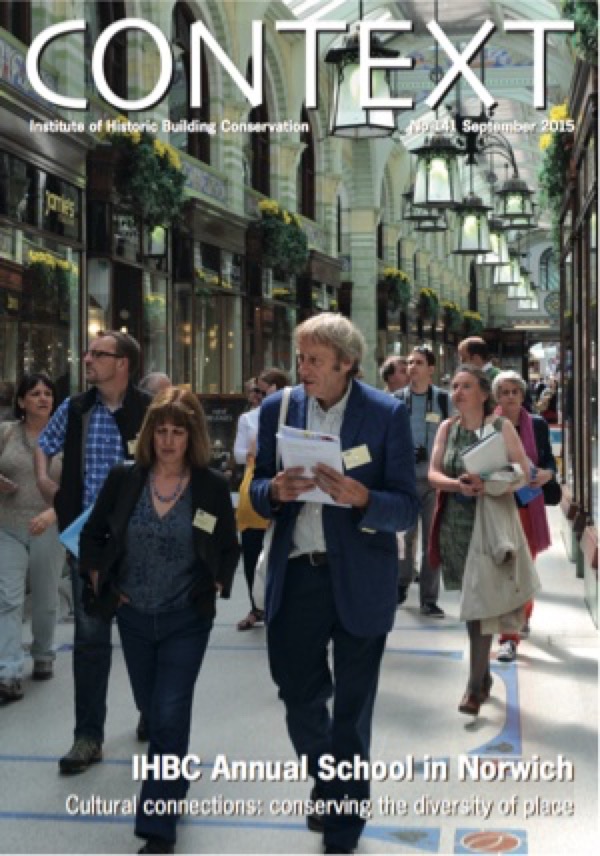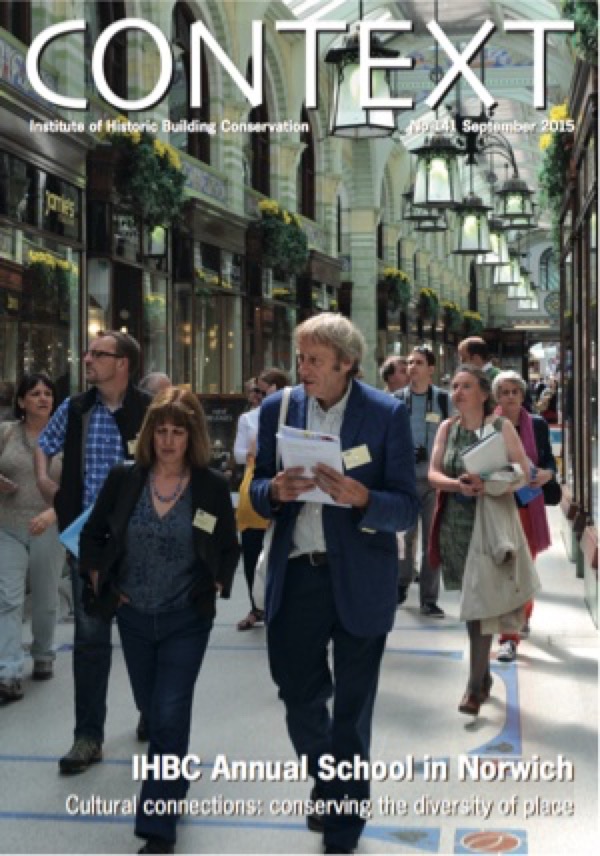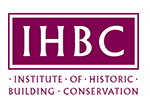
The mark of the conservation professional
2015 IHBC Annual School
Cultural Connections:
Conserving the diversity of place
Norwich
Thursday 18th to Saturday 20th June 2015
Norwich School Report - Context Issue 141, September 2015
Click image to view
1 INTRODUCTION
1.1
The IHBC Annual School is the principle platform for training and professional development for historic environment conservation specialists. It is the IHBC’s flagship national annual event drawing delegates from of IHBC members, non-member conservation professionals and the broader sector.
1.2
The 2015 Annual School was held in June 2015 in Norwich. The theme of the 2015 Annual School was ‘Cultural Connections: Conserving the diversity of place’. The built environment is dynamic, reacting to and influenced by transient people and populations that shape places through cultural change. Over time such change has helped create, adapt and shape the multi-layered and diverse historic environment that we have inherited, and that we now have a duty to preserve for future generations. The 2015 School responded to this by exploring how we can develop our understanding of how cultural change has influenced development in the past and the contribution that it makes to the significance of heritage assets. Is there a requirement for heritage conservation to maintain and enhance this cultural change within the built environment, while also allowing for continuous shaping of place? And to what extent can the conservation of heritage assets contribute towards creating sustainable and successful places in which to live?
1.3
Context, the journal of the IHBC, is a main source of record which will endure beyond the event. Six months after publication the Annual school edition of Context is made available freely to the public on the IHBC web site and the report of the 2014 School can now be seen by all at http://ihbconline.co.uk/context/136/index.html Alongside this material the web site also carries Annual School resources in perpetuity (http://ihbc.org.uk/norwich2015/index.html) including programmes, speakers presentations and feedback details ensuring that the key aspects of the School are available for open public reference and future research. This ensures the educational benefits of the School are available to all not simply IHBC members or those who attend.
1.4
The Day School looked at the following areas:
The cultural aspects attached to significance
- Discerning cultural significance in the parish church
- Recognising community connections in preserving the historic environment
- Jewish Heritage in the 21st Century
- Shaping policy: How policymakers can assist the preservation of cultural assets within the built environment.
- Change in communities: How the historic built environment adapts.
- Sharing training in traditional construction skills
- Preservation in foreign fields: Tales of a British architect abroad
2.
Monitoring success of the training capacity of the School – meeting the IHBC competences
2.1
The IHBC Annual School helps members’ meet the IHBC’s Areas of Competence and maintain these competencies. These Competences are the key membership criteria of the Institute and Annual School programmes are developed to cover as many aspects of them as possible. The Competences are shown in the table below (with more information available at link). The Areas of Competence are, however, equally relevant to non-members, conservation professionals and other built environment professionals.
2.2
The Professional Area of Competence informs and shapes conservation advice and conclusions, and is the most important and most challenging for applicants. The Practical Areas of Competence correspond to how we achieve conservation, by evaluating, managing and, as appropriate, changing places. These Practical Areas correspond respectively to cultural disciplines such as history or archaeology; to ‘place management’ and regeneration specialisms such as planning; and to design and technical solutions provided by architectural, engineering, urban design and project management skills sets (http://www.ihbc.org.uk/skills_support.htm).
2.3
The IHBC’s four Areas of Competence, as represented in the model conservation cycle, in figure 1 below, represent members’ inter-disciplinary skills – the overarching ‘Professional’ Area of Competence, and the three Practical Areas: ‘Evaluation’, ‘Management’ and ‘Intervention’.
Figure 1 IHBC Conservation Cycle and Areas of Competence

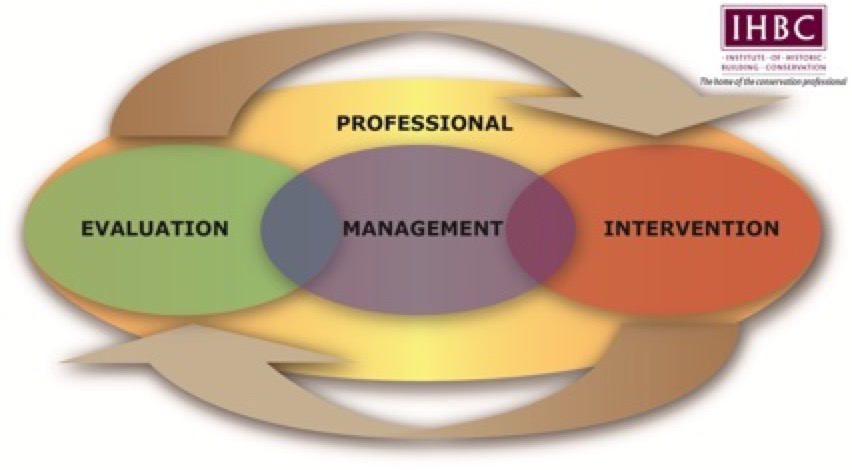
2.4
For conservation professionals including IHBC members and prospective members, issues around significance lie at the heart of the first of the IHBC’s ‘Practical Areas of Competence’, Evaluation. Significance also underpins advice and decision across all the IHBC’s Areas of Competence.
2.5
The matrix below (figure 2) explains how the 2015 Annual School provided training to meet the IHBC Areas of Competence and also dealt with the theme of the school. It shows that the Annual School sessions provided training options to cover all of the IHBC Areas of Competence whilst giving specific training on the School theme of “Cultural Connections: Conserving the diversity of place”. It is possible using the various options available for delegates to further develop all or some of their competences.
Figure 2
INDICATIVE MATRIX OF IHBC COMPETENCES AND THEMES ADDRESSED:
IHBC DAY SCHOOL 2015
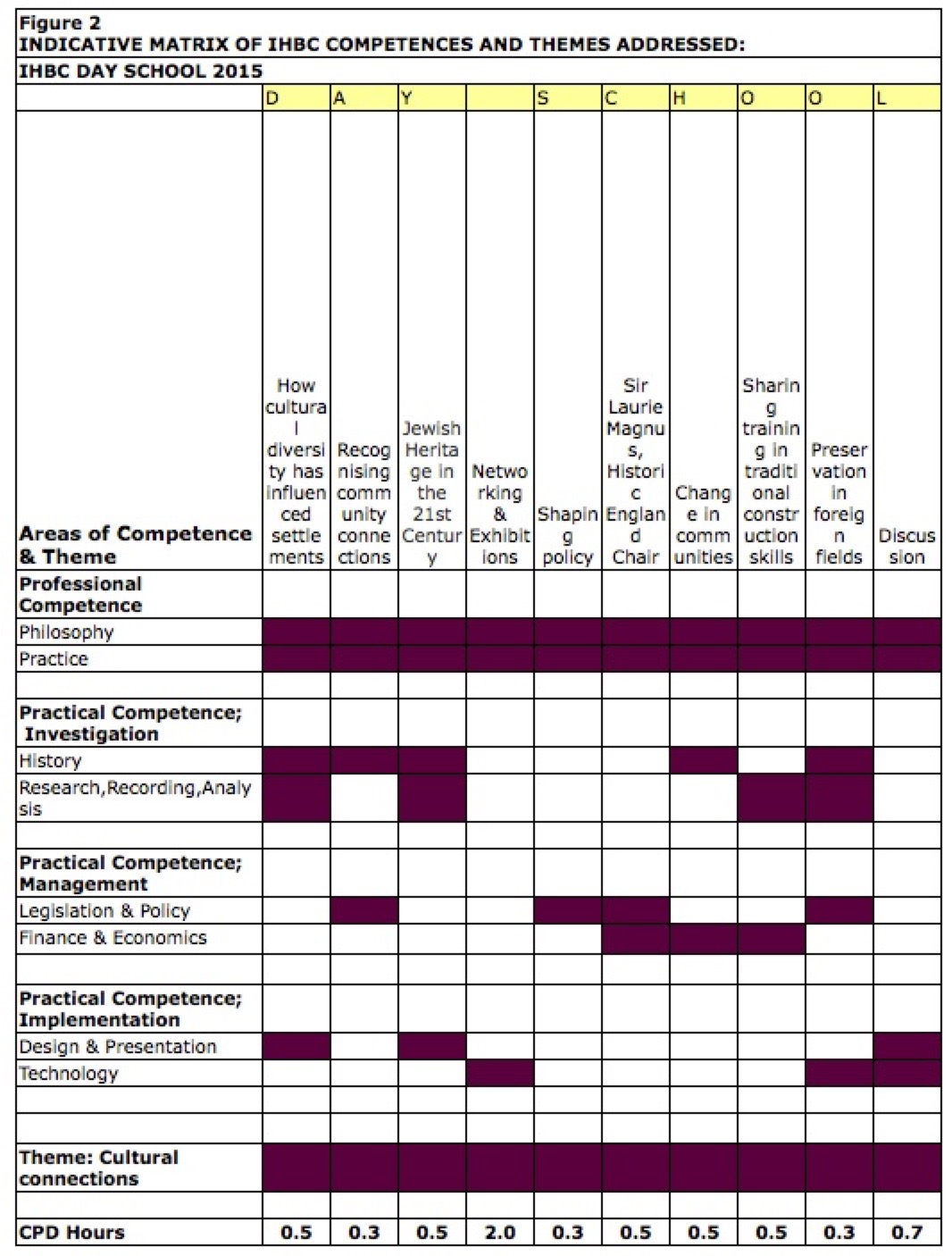
3.
Ensuring feedback from School delegates
3.1
To ensure maximum delegate feedback delegates are directed within two days of the end of the School to an electronic survey form. This approach, first used in 2009, has proved to be very successful. It simplifies the process of submitting feedback for delegates, allows them to make any additional comments with ease and has been shown to deliver more responses than paper feedback forms. In 2015 59.7% of delegates responded with delegate feedback.
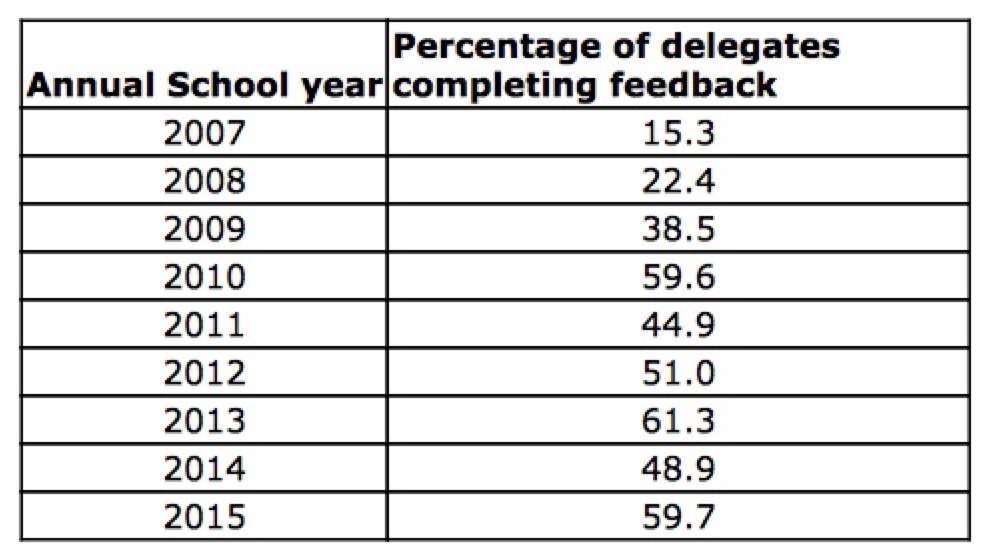
4.
Annual School Delegates
4.1
Attendance at the Annual School over the past decade has been consistently good and in 2015 the School attracted 170 delegates (69 Day School and 101 Full School).
4.2
Although the event is organised by the IHBC and is a key annual event for its members it provides training for non-members and all those with a professional interest in conservation. The Annual School continues to provide important training opportunities for those outside the Institute. In 2015 18.8% of the School delegates were not members of the IHBC, demonstrating the School’s wider appeal.
5.
Monitoring success of training capacity of school – delegate feedback
5.1
Conference content and CPD value
Delegates were asked to rate the Day School presentations and the results are shown in Figure 3.
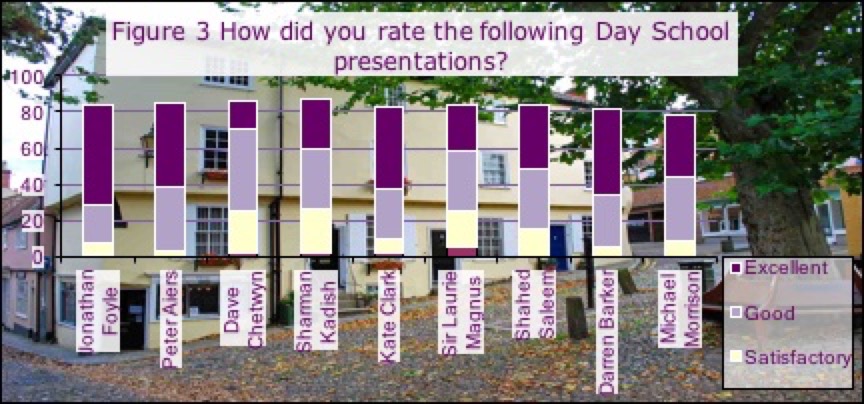
5.2
Those presentations most often rated as excellent were Jonathan Foyle’s keynote addres, Peter Aiers’s discussion of ultural significance in parish churches and Darren Barker’s look at training in traditional constructio skills. All talks were rated excellent by some delegates and very few delegates felt that any talks were unsatisfactory.
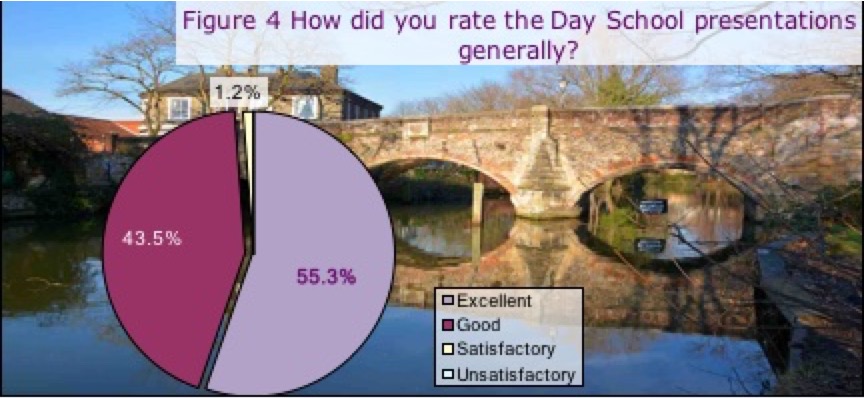
5.3
Apart from specific comments on individual presentations the general comments made by delegates showed delegates found the talks useful and relevant and comments included:
- Quality of the speakers was probably as good as I have known having attended 7 summer schools
- Excellent day school, really nice range of work
- Excellent speakers and what a mix
- Very high calibre

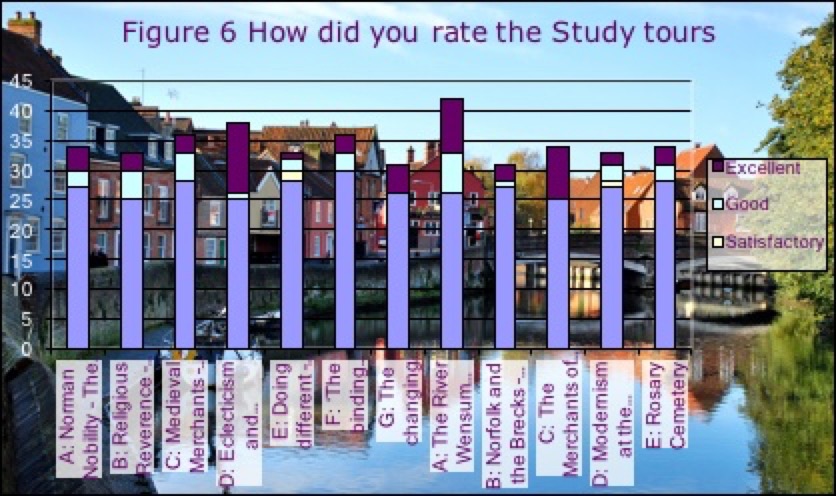
5.4
The School offered a series of study tours and visits on Thursday and Saturday. The tours received very high praise and 97% of delegates rated their tours as Excellent or Good (Figure 6). The standard and knowledge levels of tour leaders was something which was particularly noted by delegates in 2015:
- There were great choices this year.
- Both tours, but the Brecks especially, were extremely impressive not least because of the hard preparatory work and sound historical knowledge of the guides - first rate!
- Tour A: River Wensum was fab, felt connected to the locality and its past and enjoyed seeing the respectful way the river is being regenerated.
- Both tours were excellently led by two very knowledgeable individuals.
- The study tours I attended were both led by very knowledgeable and inspiring tour leaders. I enjoyed them immensely.
- Such brilliant tour leaders, subjects, areas to visit that were quite extraordinary, jaw dropping silence. There just seemed too little time to breathe
- Highlight of the conference
- The Norman Nobility tour was brilliant - we forgot to take a tea break until the end of the tour! Thanks to excellent guides the tours provided a number of stimulating ideas for thought.
- Appropriate group sizes. Well led.
- Fantastically detailed tour, enthusiastic guides.
- Both tour guides had a wealth of knowledge and the tours were fascinating.
- Dr Nicholas Groves (Thursday Tour B - Religious Reverence) and Paul Richards (Saturday Tour C - King's Lynn) were truly excellent tour leaders, extremely knowledgable about their subject and amusing to boot.
6.
Conference organisation
6.1
Delegates were asked to rate the organisation of the conference and the booking arrangements. 99% of delegates rated the organisation of the School as good or excellent (see figure 6).
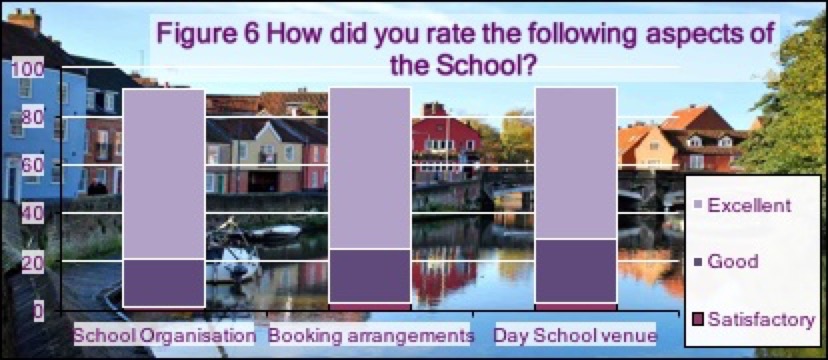
6.2
Delegates rated the main School venue highly with 98% feeling it was a good or excellent venue and none feeling it to be unsatisfactory (see figure 6). “I thought the venue was great, ticked all the boxes of meeting the practical requirements of the day as well as being in a heritage venue”
6.3
The booking arrangements were likewise rated as good or excellent by 98% of delegates.
7.
Overall conference experience
7.1
Delegates rated the overall experience they had at the conference and its usefulness very highly with 100% rating it as good or excellent. (See figure 7).
- I thought this year's school was extremely well planned and organised and, like all the best events of this type, that organisation wasn't obvious, just quietly whirring away in the background! The range of tours were a good and also well organised with, on the one's I attended at least, very good tour leaders/speakers. Venues were fantastic and food/refreshments more than adequate.
- I enjoyed the School very much and am grateful for all the effort put in by IHBC staff and the regional group - well done everyone.
- Very warm welcome from organisers and wonderful tours.
- This was an excellent event.
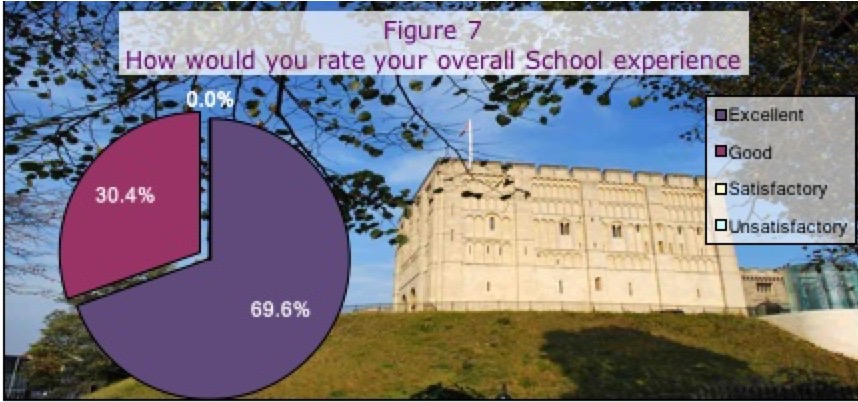
7.3
The generally high level of satisfaction is backed up further by the very encouraging data in figures 8 and 9 which reveals that 89% of delegates felt the School met their training requirements completely or sufficiently and that 100% felt the School was invaluable, very useful or useful.
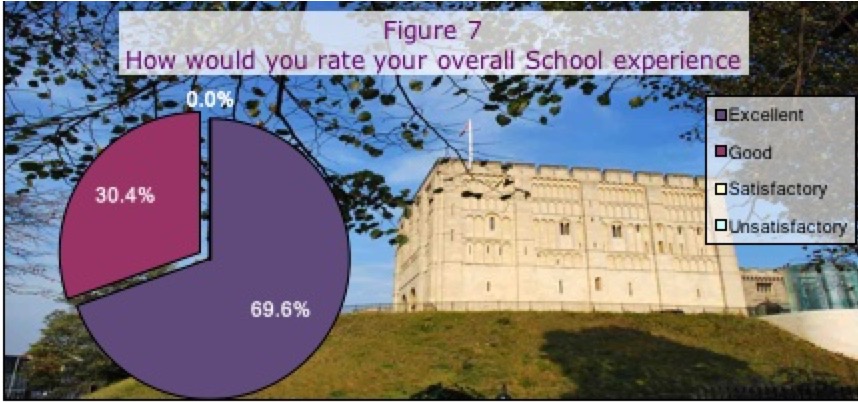
7.2
The generally high level of satisfaction is backed up further by the very encouraging data in figures 8 and 9 which reveals that 89% of delegates felt the School met their training requirements completely or sufficiently and that 100% felt the School was invaluable, very useful or useful.
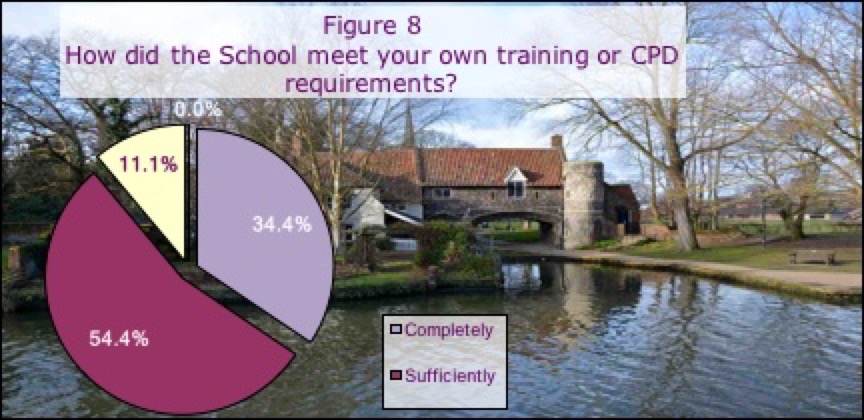
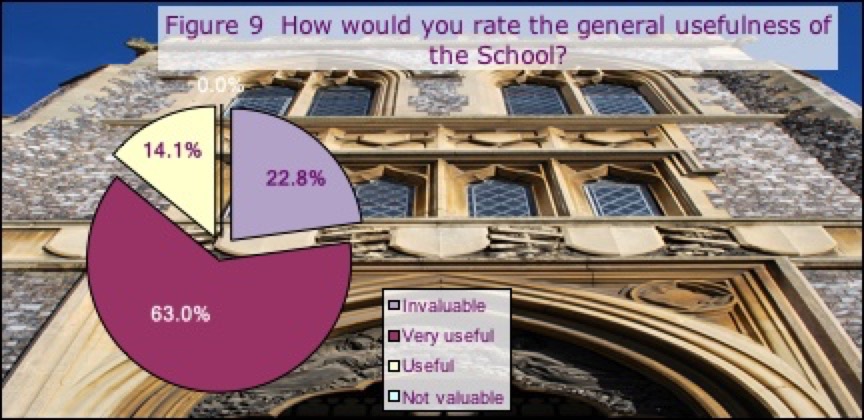
8.
Norwich
8.1
To assist in considering future events delegates were asked about their experience of visiting Norwich. 68.2% of delegates had been to Norwich before and 97.7% of delegates, whether first time visitors or not, intend to visit Norwich again (Figure 10)
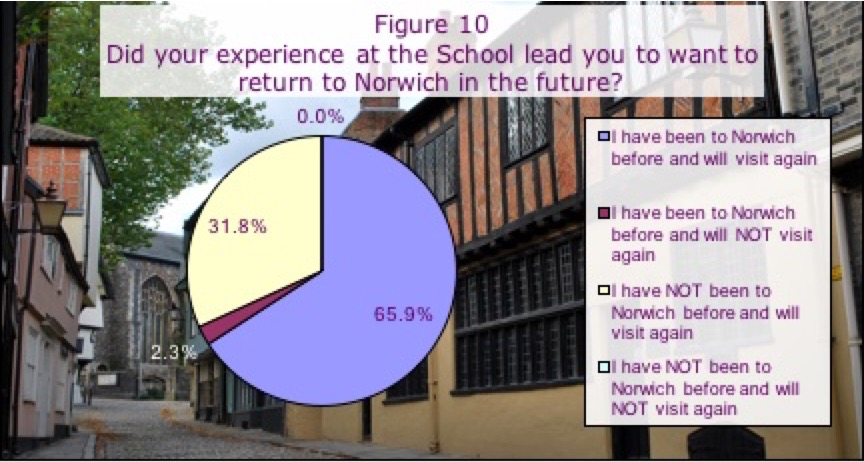
9.
Conclusion
9.1
The IHBC Annual School 2015 achieved the following:
- Provided a 3-day course in Norwich in June 2015 of focused training for conservation professionals which include a series of different training methods including lectures, visits, networking etc.
- Provide training for at least 100 delegates – 170 people attended the Day School
- Provided the opportunity for delegates to obtain up to eighteen hours of Continuing Professional Development.
- Developed IHBC branch networks and volunteer capacity to a professional standard of training delivery.
- Reinforced the importance of the IHBC Annual School in the annual training calendar of conservation professionals.
- Was rated as good or excellent by 100% of delegates
- Offered training which met the CPD requirements of 87% delegates completely or sufficiently
- Was found to be invaluable, very useful or useful by 100% of delegates
- Was rated as excellent or good by 98.8% of Day School delegates
9.2
The IHBC’s Annual School has been operating successfully since before the foundation of the Institute in 1997, and is developed from the Schools pioneered by the Association of Conservation Officers and operated effectively each year since the mid 1980’s. The Annual School is the principle platform for training and professional development for historic environment conservation specialists. It is the IHBC’s flagship national annual event drawing from customer base of IHBC members, non-member conservation professionals and broad sector interests.
9.3
The proceedings of 2015 Annual School have been described in some detail in Context the journal of the IHBC (Issue 141 September 2015) and this is a main source of record that will endure beyond the event. Six months after publication the Annual school edition of Context is made available freely to the public on the IHBC web site. Alongside this material the web site also carries Annual School resources in perpetuity (http://www.ihbc.org.uk/learning/page38/index.html) including programmes, speakers presentations and feedback details ensuring that the key aspects of the School are available for open public reference and future research.
9.4
The successful delivery of the 2015 School has reinforced the importance of the IHBC Annual School in the annual training calendar of conservation professionals and provided the opportunity for delegates to obtain quality, focused Continuing Professional Development.
2015 IHBC Annual School
Cultural Connections:
Conserving the diversity of place
Norwich
Thursday 18th to Saturday 20th June 2015
Norwich School Report - Context Issue 141, September 2015
Click image to view
1 INTRODUCTION
1.1
The IHBC Annual School is the principle platform for training and professional development for historic environment conservation specialists. It is the IHBC’s flagship national annual event drawing delegates from of IHBC members, non-member conservation professionals and the broader sector.
1.2
The 2015 Annual School was held in June 2015 in Norwich. The theme of the 2015 Annual School was ‘Cultural Connections: Conserving the diversity of place’. The built environment is dynamic, reacting to and influenced by transient people and populations that shape places through cultural change. Over time such change has helped create, adapt and shape the multi-layered and diverse historic environment that we have inherited, and that we now have a duty to preserve for future generations. The 2015 School responded to this by exploring how we can develop our understanding of how cultural change has influenced development in the past and the contribution that it makes to the significance of heritage assets. Is there a requirement for heritage conservation to maintain and enhance this cultural change within the built environment, while also allowing for continuous shaping of place? And to what extent can the conservation of heritage assets contribute towards creating sustainable and successful places in which to live?
1.3
Context, the journal of the IHBC, is a main source of record which will endure beyond the event. Six months after publication the Annual school edition of Context is made available freely to the public on the IHBC web site and the report of the 2014 School can now be seen by all at http://ihbconline.co.uk/context/136/index.html Alongside this material the web site also carries Annual School resources in perpetuity (http://ihbc.org.uk/norwich2015/index.html) including programmes, speakers presentations and feedback details ensuring that the key aspects of the School are available for open public reference and future research. This ensures the educational benefits of the School are available to all not simply IHBC members or those who attend.
1.4
The Day School looked at the following areas:
The cultural aspects attached to significance
- Discerning cultural significance in the parish church
- Recognising community connections in preserving the historic environment
- Jewish Heritage in the 21st Century
- Shaping policy: How policymakers can assist the preservation of cultural assets within the built environment.
- Change in communities: How the historic built environment adapts.
- Sharing training in traditional construction skills
- Preservation in foreign fields: Tales of a British architect abroad
2.
Monitoring success of the training capacity of the School – meeting the IHBC competences
2.1
The IHBC Annual School helps members’ meet the IHBC’s Areas of Competence and maintain these competencies. These Competences are the key membership criteria of the Institute and Annual School programmes are developed to cover as many aspects of them as possible. The Competences are shown in the table below (with more information available at http://www.ihbc.org.uk/join/index.html). The Areas of Competence are, however, equally relevant to non-members, conservation professionals and other built environment professionals.
2.2
The Professional Area of Competence informs and shapes conservation advice and conclusions, and is the most important and most challenging for applicants. The Practical Areas of Competence correspond to how we achieve conservation, by evaluating, managing and, as appropriate, changing places. These Practical Areas correspond respectively to cultural disciplines such as history or archaeology; to ‘place management’ and regeneration specialisms such as planning; and to design and technical solutions provided by architectural, engineering, urban design and project management skills sets (http://www.ihbc.org.uk/skills_support.htm).
2.3
The IHBC’s four Areas of Competence, as represented in the model conservation cycle, in figure 1 below, represent members’ inter-disciplinary skills – the overarching ‘Professional’ Area of Competence, and the three Practical Areas: ‘Evaluation’, ‘Management’ and ‘Intervention’.
Figure 1 IHBC Conservation Cycle and Areas of Competence

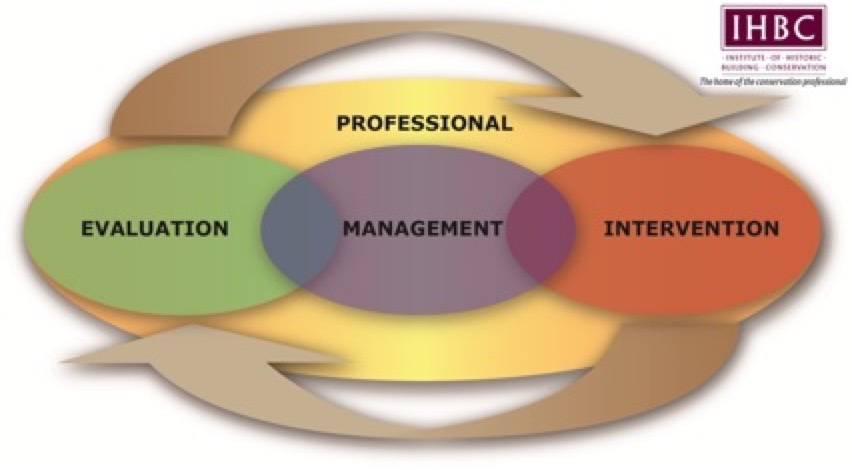
2.4
For conservation professionals including IHBC members and prospective members, issues around significance lie at the heart of the first of the IHBC’s ‘Practical Areas of Competence’, Evaluation. Significance also underpins advice and decision across all the IHBC’s Areas of Competence.
2.5
The matrix below (figure 2) explains how the 2015 Annual School provided training to meet the IHBC Areas of Competence and also dealt with the theme of the school. It shows that the Annual School sessions provided training options to cover all of the IHBC Areas of Competence whilst giving specific training on the School theme of “Cultural Connections: Conserving the diversity of place”. It is possible using the various options available for delegates to further develop all or some of their competences.
Figure 2
INDICATIVE MATRIX OF IHBC COMPETENCES AND THEMES ADDRESSED:
IHBC DAY SCHOOL 2015
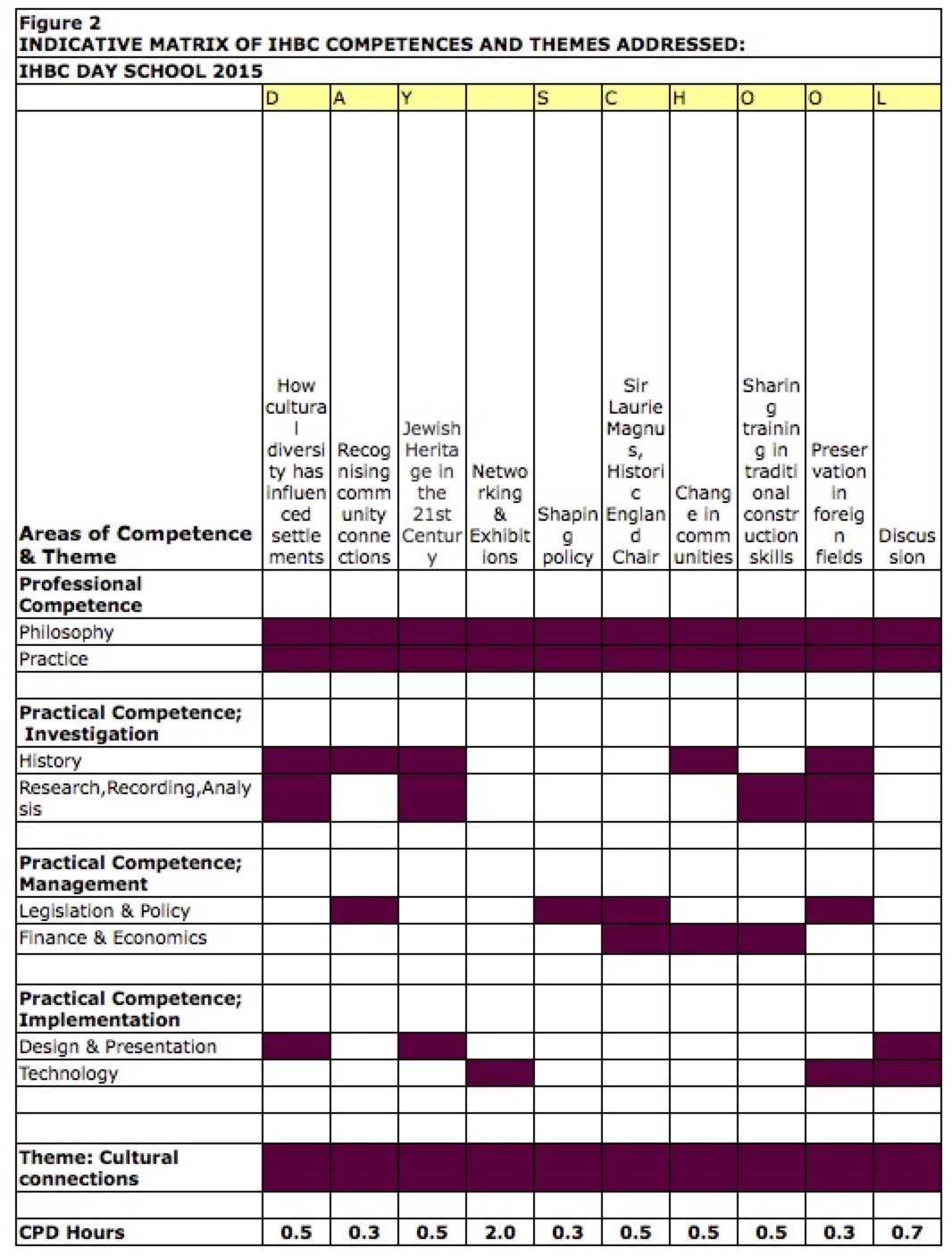
3.
Ensuring feedback from School delegates
3.1
To ensure maximum delegate feedback delegates are directed within two days of the end of the School to an electronic survey form. This approach, first used in 2009, has proved to be very successful. It simplifies the process of submitting feedback for delegates, allows them to make any additional comments with ease and has been shown to deliver more responses than paper feedback forms. In 2015 59.7% of delegates responded with delegate feedback.
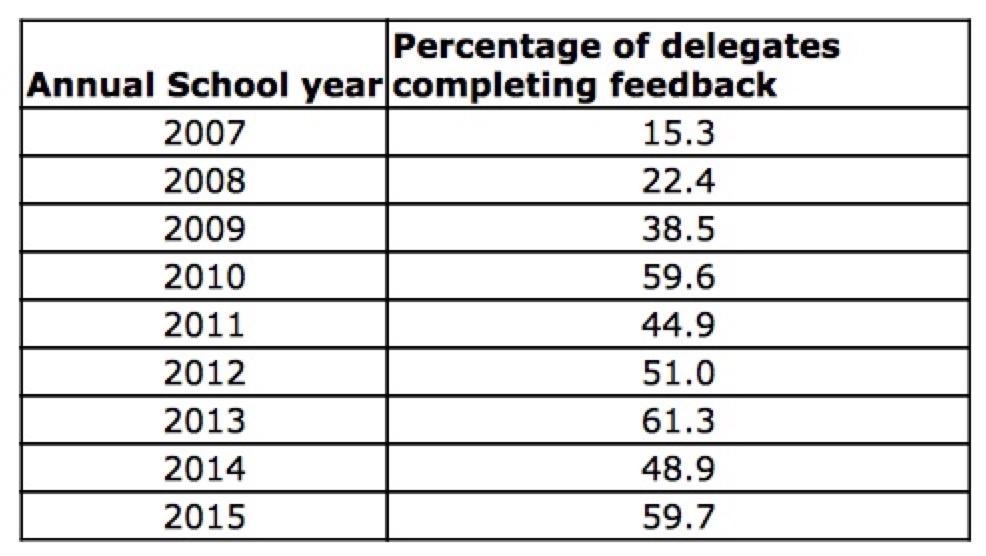
4.
Annual School Delegates
4.1
Attendance at the Annual School over the past decade has been consistently good and in 2015 the School attracted 170 delegates (69 Day School and 101 Full School).
4.2
Although the event is organised by the IHBC and is a key annual event for its members it provides training for non-members and all those with a professional interest in conservation. The Annual School continues to provide important training opportunities for those outside the Institute. In 2015 18.8% of the School delegates were not members of the IHBC, demonstrating the School’s wider appeal.
5.
Monitoring success of training capacity of school – delegate feedback
5.1
Conference content and CPD value
Delegates were asked to rate the Day School presentations and the results are shown in Figure 3.
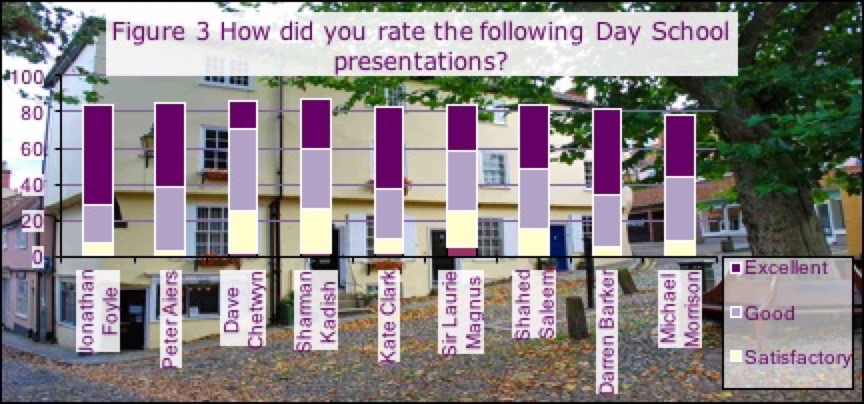
5.2
Those presentations most often rated as excellent were Jonathan Foyle’s keynote addres, Peter Aiers’s discussion of ultural significance in parish churches and Darren Barker’s look at training in traditional constructio skills. All talks were rated excellent by some delegates and very few delegates felt that any talks were unsatisfactory.
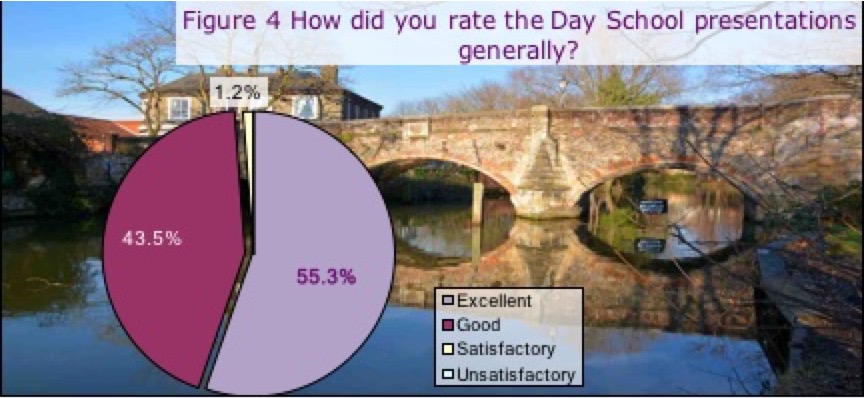
5.3
Apart from specific comments on individual presentations the general comments made by delegates showed delegates found the talks useful and relevant and comments included:
- Quality of the speakers was probably as good as I have known having attended 7 summer schools
- Excellent day school, really nice range of work
- Excellent speakers and what a mix
- Very high calibre

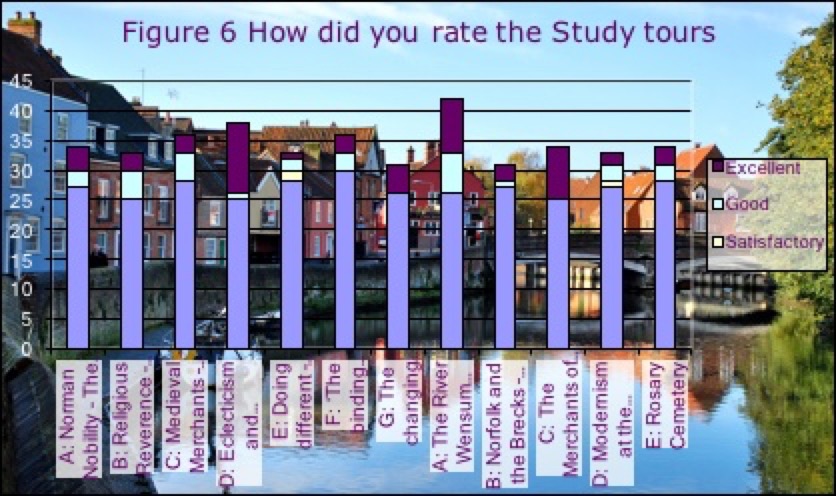
5.4
The School offered a series of study tours and visits on Thursday and Saturday. The tours received very high praise and 97% of delegates rated their tours as Excellent or Good (Figure 6). The standard and knowledge levels of tour leaders was something which was particularly noted by delegates in 2015:
- There were great choices this year.
- Both tours, but the Brecks especially, were extremely impressive not least because of the hard preparatory work and sound historical knowledge of the guides - first rate!
- Tour A: River Wensum was fab, felt connected to the locality and its past and enjoyed seeing the respectful way the river is being regenerated.
- Both tours were excellently led by two very knowledgeable individuals.
- The study tours I attended were both led by very knowledgeable and inspiring tour leaders. I enjoyed them immensely.
- Such brilliant tour leaders, subjects, areas to visit that were quite extraordinary, jaw dropping silence. There just seemed too little time to breathe
- Highlight of the conference
- The Norman Nobility tour was brilliant - we forgot to take a tea break until the end of the tour! Thanks to excellent guides the tours provided a number of stimulating ideas for thought.
- Appropriate group sizes. Well led.
- Fantastically detailed tour, enthusiastic guides.
- Both tour guides had a wealth of knowledge and the tours were fascinating.
- Dr Nicholas Groves (Thursday Tour B - Religious Reverence) and Paul Richards (Saturday Tour C - King's Lynn) were truly excellent tour leaders, extremely knowledgable about their subject and amusing to boot.
6.
Conference organisation
6.1
Delegates were asked to rate the organisation of the conference and the booking arrangements. 99% of delegates rated the organisation of the School as good or excellent (see figure 6).
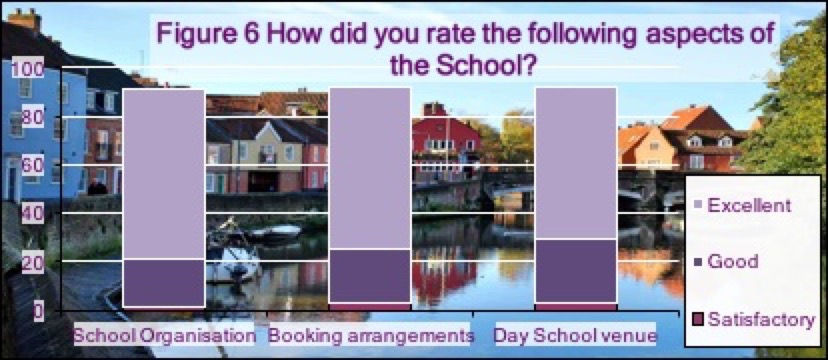
6.2
Delegates rated the main School venue highly with 98% feeling it was a good or excellent venue and none feeling it to be unsatisfactory (see figure 6). “I thought the venue was great, ticked all the boxes of meeting the practical requirements of the day as well as being in a heritage venue”
6.3
The booking arrangements were likewise rated as good or excellent by 98% of delegates.
7.
Overall conference experience
7.1
Delegates rated the overall experience they had at the conference and its usefulness very highly with 100% rating it as good or excellent. (See figure 7).
- I thought this year's school was extremely well planned and organised and, like all the best events of this type, that organisation wasn't obvious, just quietly whirring away in the background! The range of tours were a good and also well organised with, on the one's I attended at least, very good tour leaders/speakers. Venues were fantastic and food/refreshments more than adequate.
- I enjoyed the School very much and am grateful for all the effort put in by IHBC staff and the regional group - well done everyone.
- Very warm welcome from organisers and wonderful tours.
- This was an excellent event.
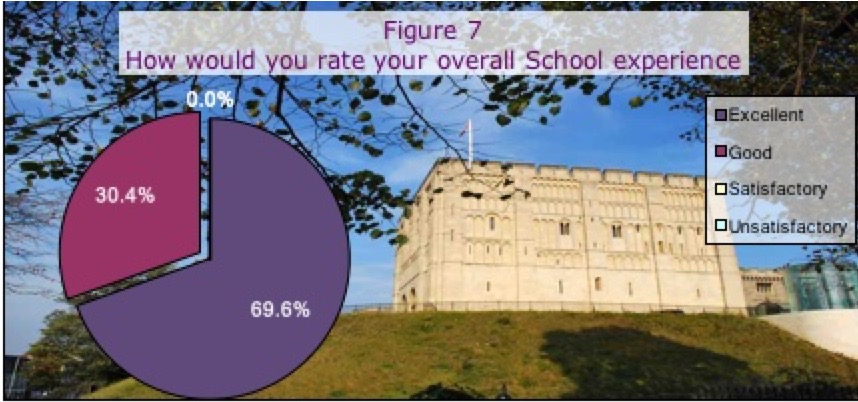
7.3
The generally high level of satisfaction is backed up further by the very encouraging data in figures 8 and 9 which reveals that 89% of delegates felt the School met their training requirements completely or sufficiently and that 100% felt the School was invaluable, very useful or useful.
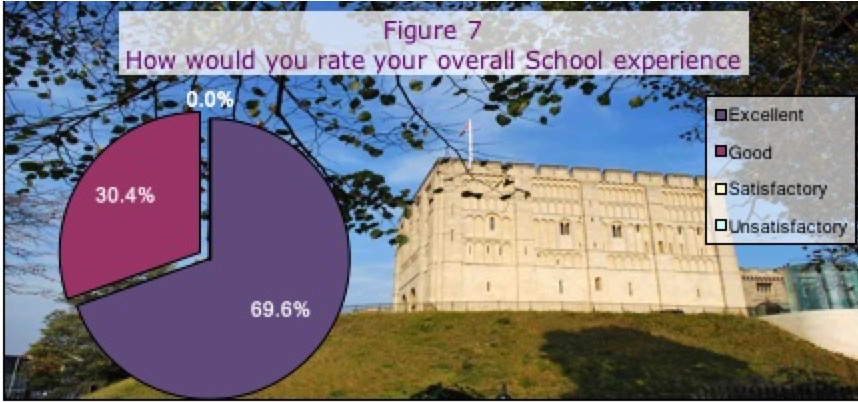
7.2
The generally high level of satisfaction is backed up further by the very encouraging data in figures 8 and 9 which reveals that 89% of delegates felt the School met their training requirements completely or sufficiently and that 100% felt the School was invaluable, very useful or useful.
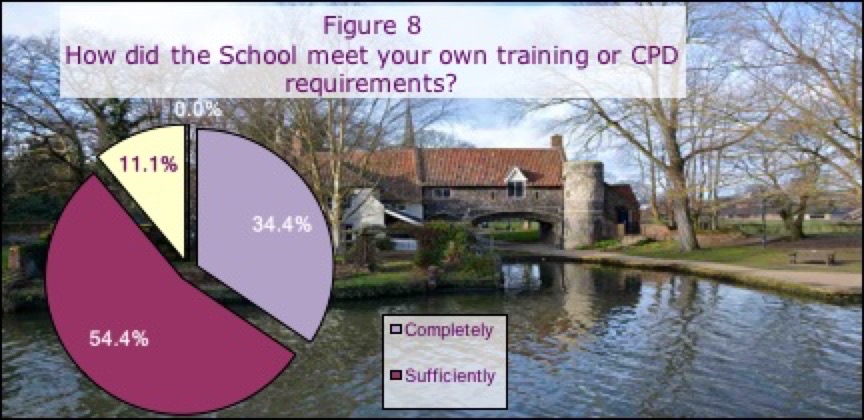
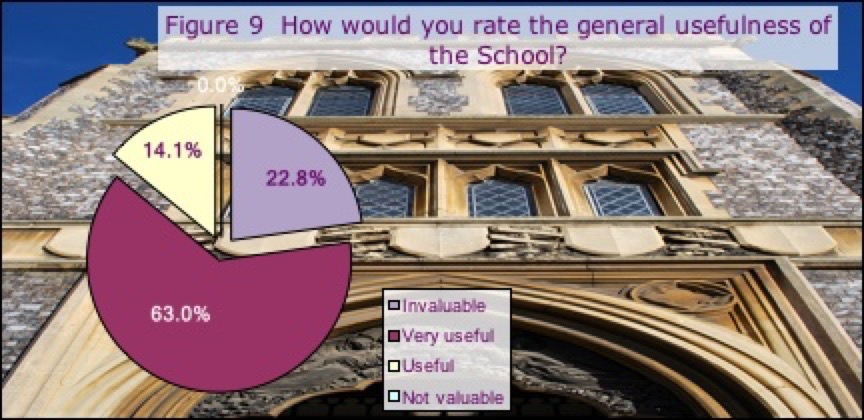
8.
Norwich
8.1
To assist in considering future events delegates were asked about their experience of visiting Norwich. 68.2% of delegates had been to Norwich before and 97.7% of delegates, whether first time visitors or not, intend to visit Norwich again (Figure 10)
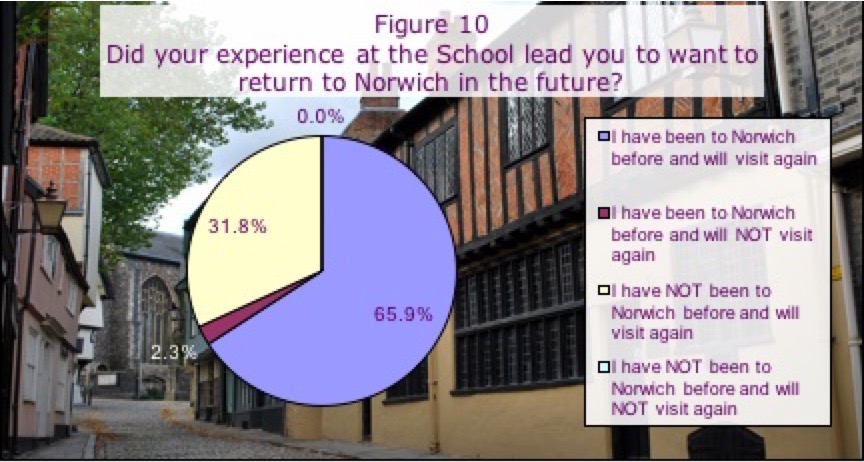
9.
Conclusion
9.1
The IHBC Annual School 2015 achieved the following:
- Provided a 3-day course in Norwich in June 2015 of focused training for conservation professionals which include a series of different training methods including lectures, visits, networking etc.
- Provide training for at least 100 delegates – 170 people attended the Day School
- Provided the opportunity for delegates to obtain up to eighteen hours of Continuing Professional Development.
- Developed IHBC branch networks and volunteer capacity to a professional standard of training delivery.
- Reinforced the importance of the IHBC Annual School in the annual training calendar of conservation professionals.
- Was rated as good or excellent by 100% of delegates
- Offered training which met the CPD requirements of 87% delegates completely or sufficiently
- Was found to be invaluable, very useful or useful by 100% of delegates
- Was rated as excellent or good by 98.8% of Day School delegates
9.2
The IHBC’s Annual School has been operating successfully since before the foundation of the Institute in 1997, and is developed from the Schools pioneered by the Association of Conservation Officers and operated effectively each year since the mid 1980’s. The Annual School is the principle platform for training and professional development for historic environment conservation specialists. It is the IHBC’s flagship national annual event drawing from customer base of IHBC members, non-member conservation professionals and broad sector interests.
9.3
The proceedings of 2015 Annual School have been described in some detail in Context the journal of the IHBC (Issue 141 September 2015) and this is a main source of record that will endure beyond the event. Six months after publication the Annual school edition of Context is made available freely to the public on the IHBC web site. Alongside this material the web site also carries Annual School resources in perpetuity (http://www.ihbc.org.uk/learning/page38/index.html) including programmes, speakers presentations and feedback details ensuring that the key aspects of the School are available for open public reference and future research.
9.4
The successful delivery of the 2015 School has reinforced the importance of the IHBC Annual School in the annual training calendar of conservation professionals and provided the opportunity for delegates to obtain quality, focused Continuing Professional Development.
